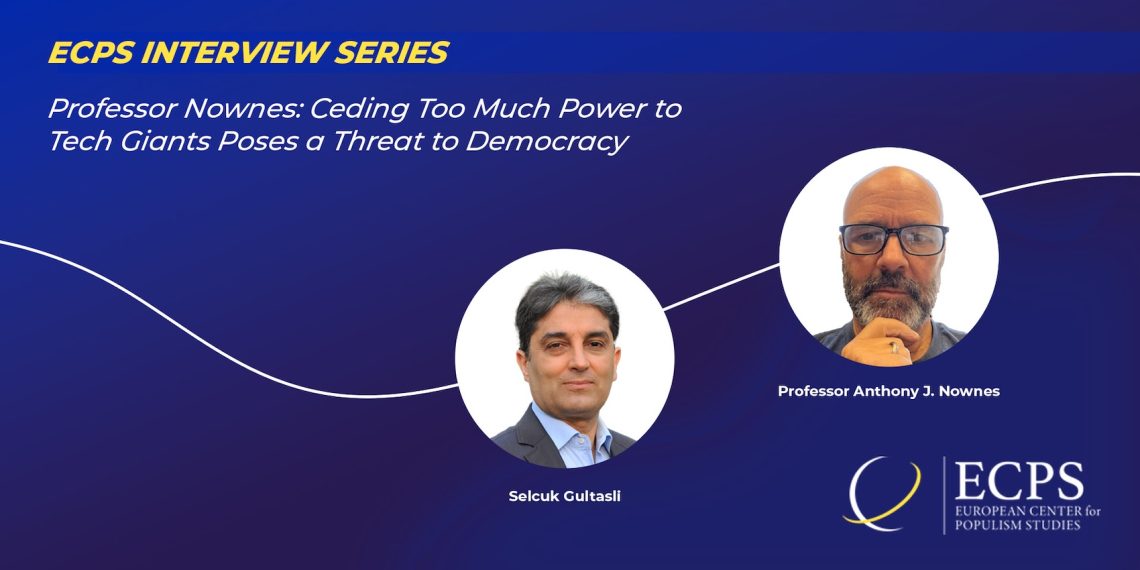Highlighting Elon Musk’s dual role as a private tech mogul and a potential quasi-governmental leader under elected US President Donald Trump, Professor Anthony J. Nownes underscored the dangers of unregulated private power intersecting with public institutions. He emphasized that ceding excessive power to any private interest—whether in the tech industry or another sector—poses a significant threat to democracy. Illustrating this concern, Professor Nownes pointed to the proposed “Doge Department,” noting, “Unlike actual government departments with conflict-of-interest rules, such private entities lack safeguards, making them a potential avenue for unchecked influence over public resources.”
Interview by Selcuk Gultasli
In an illuminating discussion with the European Center for Populism Studies (ECPS), Professor Anthony J. Nownes, a political science expert from the University of Tennessee and co-author of the book titled The New Entrepreneurial Advocacy -Silicon Valley Elites in American Politics, offered his insights on the growing influence of tech elites and its implications for democracy. Centering on the theme of the delicate balance between private power and public accountability, Professor Nownes emphasized a pressing concern: “Ceding too much power to any private interest—whether the tech industry or any other sector—poses a threat to democracy.”
Highlighting Elon Musk’s dual role as a private tech mogul and a potential quasi-governmental leader under elected US President Donald Trump, Professor Nownes pointed out the dangers of unregulated private power intersecting with public institutions. He explained, for instance, the risks of the proposed "Doge Department" (or Department of Government Efficiency), stating that “unlike actual government departments with conflict-of-interest rules, such private entities lack safeguards, making them a potential avenue for unchecked influence over public resources.”
Turning to the broader historical context, Professor Nownes compared today’s tech moguls to past industrial giants. While corporate influence is not a new phenomenon, he argued that the tech industry’s vast resources and rapid innovation—outpacing government regulation—make its impact unique. Using examples like Microsoft protecting Ukraine from cyberattacks and SpaceX ensuring Ukrainian connectivity, Professor Nownes highlighted how tech companies wield unprecedented power over geopolitical and societal outcomes.
On the issue of lobbying and political advocacy, Professor Nownes delved into the disproportionate focus of Silicon Valley philanthropy on post-material causes, such as environmental conservation and DEI (Diversity, Equity, and Inclusion), rather than structural inequalities. He warned that this prioritization risks sidelining critical issues like income inequality and homelessness, leaving a vacuum often filled by populists like Donald Trump, who, while lacking substantive solutions, at least address these concerns rhetorically.
Professor Nownes also discussed the erosion of public trust in tech companies, exacerbated by scandals such as Cambridge Analytica. Referencing a Pew study that found 78% of Americans believe social media companies wield too much political power, he noted that despite this skepticism, tech giants have not yet faced significant political or economic repercussions. However, he foresees this changing, particularly as ethical considerations—such as the negative effects of social media on children—gain political traction.
Professor Nownes also addressed the future of American democracy under a second Trump administration. While cautiously optimistic about its survival, he acknowledged the erosion of democratic norms and the slow response of legal institutions to recent challenges. His reflections offer a sobering reminder of the delicate equilibrium between private power and public accountability, as well as the need for vigilance in preserving democratic principles in the face of rapid technological and political change.
Here is the transcription of the interview with Professor Anthony J. Nownes with some edits.


